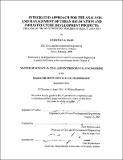Integrated approach for the analysis and management of urban relocation and infrastructure development projects : the case of the southwestern suburbs of Beirut, Lebanon
Author(s)
Saad, Christian A. (Christian Antoine), 1979-
DownloadFull printable version (69.31Mb)
Other Contributors
Massachusetts Institute of Technology. Dept. of Civil and Environmental Engineering.
Advisor
Fred Moavenzadeh.
Terms of use
Metadata
Show full item recordAbstract
Relocation of inhabitants and infrastructure development for urban renewal is a main problem facing major cities and their suburbs. It is always subject to economic, political, social, cultural, religious, and environmental constraints. Urban renewal had been adopted by governments and international development agencies for years, and was subject to failure when the solution implemented did not fully account for the unique circumstances on hand. This thesis, by using a case study in Beirut, Lebanon, aims at providing a framework that integrates construction management, decision-analysis, and urban planning tools, and that offers a stronger and robust platform for solving urban relocation and infrastructure development projects. The project of Elyssar, which aims at planning, developing, and revitalizing the southwestern suburbs of Beirut, Lebanon, is chosen as a case study to investigate the economic/financial component of the overall multiobjective-multicriterion decision analysis problem and to suggest ways for the public sector to increase the project's revenue stream, decrease its large cost components which dominate the cash flow, and determine the cost that will need to be subsidized. This is done using the net present value and sensitivity analysis method of assessment. The results conclude that no direct benefits are encountered. The public sector will have to subsidize the project by buying upfront the social welfare and the economic improvements that are to materialize in the future. The involvement of the private sector in project implementation is also tested and the feasibility of a public-private partnership is evaluated. The outcome concludes that if the public sector shows commitment to the project, it would be attractive to procure the project through the public-private partnership format. Finally recommendations are provided to the Elyssar management as to what critical urban relocation elements and policies need to be addressed more closely to ensure the success of the project. It also encourages further research along this line to allow future integration of related factors that are social, political, and anthropological in nature.
Description
Thesis (S.M.)--Massachusetts Institute of Technology, Dept. of Civil and Environmental Engineering, 2001. Includes bibliographical references (leaves 206-209).
Date issued
2001Department
Massachusetts Institute of Technology. Department of Civil and Environmental EngineeringPublisher
Massachusetts Institute of Technology
Keywords
Civil and Environmental Engineering.